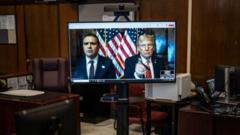In a landmark ruling that echoes throughout the annals of American political history, Justice Juan Merchan sentenced Donald Trump to an "unconditional discharge" in the Manhattan hush-money case. The outcome means that Trump, set to take office again as president, is not subject to any penalties, including fines or imprisonment. "This court has never encountered such a unique and remarkable case," declared Justice Merchan before delivering a sentence that would allow Trump to begin his second presidential term without lingering legal repercussions.
Participating via video feed from Florida, Trump appeared determined to assert his innocence, stating, "I am totally innocent." Notably, this marked the first occasion in this protracted legal saga where Trump elucidated more than a simple "not guilty" plea. Given the opportunity to express his thoughts prior to the sentencing, he took full advantage, lamenting what he labeled a "weaponization" of the judicial system. Trump criticized Manhattan District Attorney Alvin Bragg for pursuing what he deemed politically motivated charges, asserting that he endured significant unfair treatment.
As the judge contemplated the trial's implications, he noted the paradox of the proceedings: despite the media frenzy surrounding Trump, the legal nuances bore similarity to other ongoing cases. However, the judge remarked that Trump’s conviction took an unexpected turn when the electorate chose to elect him again in November. Justice Merchan concluded that "the only lawful sentence" in light of this political reality was the unconditional discharge, thereby ensuring a president free from the burden of legal controversies.
The legal struggle arose from payments that Trump made to cover up a hush-money arrangement with adult film actress Stormy Daniels during the 2016 election campaign. The prosecution's contention was that the payment served as a form of election interference, ultimately undermining electoral law when voters were kept in the dark regarding critical information. Following his election, Trump reimbursed his attorney, Michael Cohen, for the payment, classifying the reimbursements as legal fees—an action that resulted in 34 felony counts of falsifying business records.
While he was found guilty, Trump continuously denied the allegations, branding the investigation a politically engineered persecution. This six-week trial sparked intense media coverage and brought forth colorful personalities like Cohen and Daniels into the courtroom spotlight. In a show of solidarity, Trump frequently appeared in court surrounded by family and Republican allies while expressing grievances against the judiciary and the media.
Trump's enduring legal challenges span four criminal cases between his terms, but the hush-money trial is the only case to reach trial thus far. Despite several indictments surrounding various issues, including his efforts to overturn the 2020 election results, he was ultimately able to secure a second presidential term, stifling federal prosecutions related to election interference and classified documents mismanagement.
Even after the verdict, legal battles ensued, with Trump's attorneys seeking interventions from higher courts to block proceedings. Ultimately, as the New York trial reached its conclusion, it highlighted a unique chapter in Trump's political saga. Justice Merchan's closing sentiment carried significant weight as he wished Trump "Godspeed" for his upcoming second term in office—a blend of historical significance and the complexities of American justice in the context of politics.





















